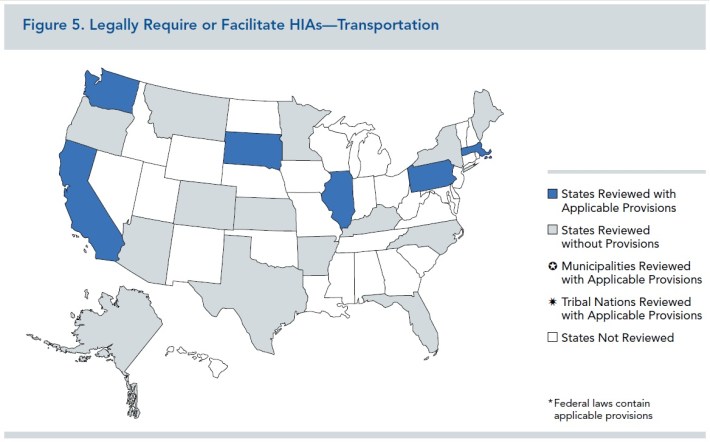Transportation projects often have profound consequences for public health, whether negative (in the case of fossil fuel-burning highway expansions) or positive (in the case of calorie-burning bike-friendly, walkable streets). So why don't cities and states always consider health impacts when evaluating a transportation project or policy?
That's the question at the heart of a new paper released today by the Pew Health Group and the Robert Wood Johnson Foundation [PDF], prepared by the Sandra Day O'Connor College of Law at Arizona State University.
The authors looked at the prevalence of "Health Impact Assessments," which analyze the public health effects of a particular project or policy on a given population. Think of it as an Environmental Impact Statement, only the indicators are people, not ecosystems. HIAs are already used to inform policy decisions concerning health care or disease prevention, but they have also been used to evaluate transportation projects, like the East Bay Greenway. The HIA for the greenway influenced the design of the project, suggesting better integration with existing biking and walking paths, and helped to secure funding from Alameda County.
In some places, the report found, HIAs are already required in non-health policy sectors, while in others they are actually prohibited by law (though never for transportation). Most jurisdictions fall somewhere in between, with HIAs allowed but not mandated. (An EIS, on the other hand, is required by federal law for certain projects.)
The report does not evaluate the effectiveness of HIAs. Rather, the authors suggest that where HIAs have been slow to take root, an understanding of the law can increase their importance:
Interestingly, HIA practitioners have rarely used legal arguments to advocate for consideration of the findings or recommendations. More commonly, HIAs have been conducted through voluntary efforts by health officials, advocates, or officials outside the health sector who are interested in ensuring that the health implications of a proposed action are proactively identified and addressed. The findings and recommendations are often considered and acted on by responsible officials, but not necessarily because of legal requirements to do so.
The findings of our research do not suggest that there is a need to invoke legal arguments in cases where this voluntary approach is successful. Where effective, HIA practitioners can continue to conduct successful HIAs solely through building strong cross-sector collaborations, providing robust scientific analysis and recommendations, and educating decision makers and community members about the health impacts of proposed policies, projects, and plans, even when HIAs are not clearly required or facilitated by law.
The study compared 36 different jurisdictions, including 20 states, 10 cities, and five Native American tribes, as well as the federal government. Most supportive of transportation HIAs were Massachusetts, which adopted a "Healthy Transportation Compact" in 2009, and Washington State, which legally required an HIA as part of a bridge replacement project in 2007.
Overall, there were seven jurisdictions in which transportation HIAs were legally viable, if not already mandated.
Read the Health Impact Project's full statement here, alongside helpful links to additional resources relating to their research.






